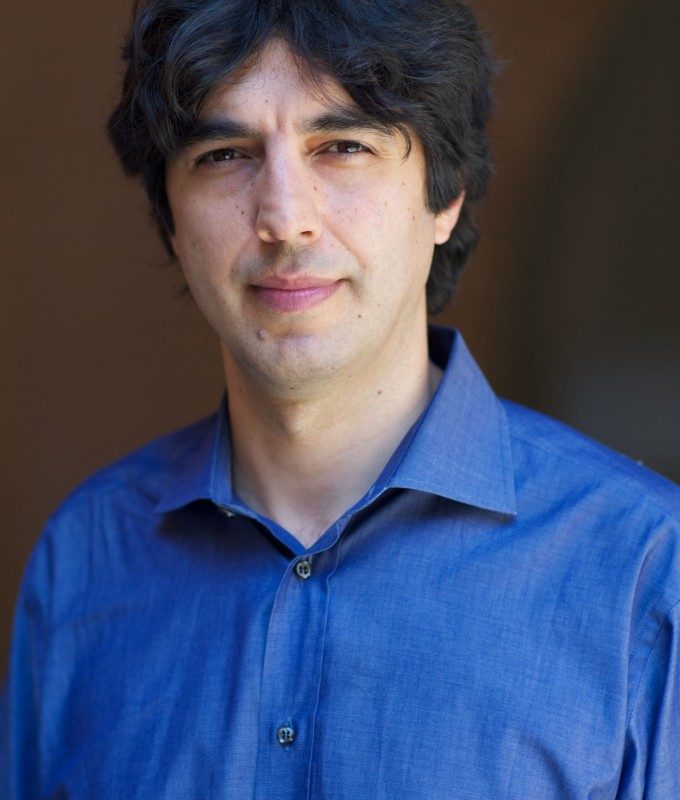
Video by the USC Davis School of Gerontology
Valter Longo, PhD, principal investigator with USC Stem Cell, is out to prove that gerontology is a young man’s game — just like rock and roll. The 46-year-old USC professor of gerontology and biological sciences has dedicated his career to slowing the implacable process of getting older.
Growing up in Genoa, Italy, Longo spent countless hours emulating the guitar stylings of rock legends Jimi Hendrix and Mark Knopfler from Dire Straits. At age 16, he moved to Chicago to take jazz guitar lessons before heading to the University of North Texas to continue his studies under Jack Petersen.
During his second year as a music major, Longo was tapped to direct the marching band. As a musician with sensibilities deeply rooted in rock, he refused, and the music department told him to find a different major.
“Without hesitation, I said, ‘I want to learn about aging.’ Scientifically, I thought it was an incredible thing to figure out. And then medically, I thought that this is also going to be very central because most diseases, people get them when they’re old,” he explained.
When he moved to Los Angeles to pursue his PhD in biochemistry at UCLA, he also formed and began touring with a band called DOT. Eventually, the band signed a development contract with Interscope Records.
“I liked the concept of a dot, which is really nothing but at the same time is the component of everything,” he said.
At the same time, he was working in the UCLA lab of Roy Walford, MD, a world-famous pioneer and practitioner of calorie restriction for longevity. For part of that time, Longo used a video conferencing system to communicate with Walford, who was sealed inside a self-contained glass structure called Biosphere 2 in the Arizona desert from 1991–1993.
After a couple of years, Longo decided that he wanted to bring a more molecular approach to questions of aging, so he joined the UCLA labs of chemist Joan S. Valentine, PhD, and geneticist Edith B. Gralla, PhD.
Looking at yeast, a very simple unicellular organism, he discovered a group of genes that promote the aging process in response to glucose. By knocking out these genes, he could mimic a calorie- and glucose-restricted diet and extend the lifespan of yeast. These genes are also present in humans.
First as a postdoctoral fellow, and then as a faculty member and director of the Longevity Institute at USC, Longo has continued this research into the genes that control aging.
In 2001, he discovered another important group of yeast genes that control both aging and overall growth in response to amino acids. He later found a population of humans in Ecuador that had a mutation in the equivalent genes. As a result, they lacked a growth-hormone receptor, and this made them both small in stature and long-lived, with very little susceptibility to diabetes or cancer.
By inhibiting these same groups of genes either by mutations or starvation, Longo has found evidence that healthy cells might receive protection not only from the stresses of aging, but also from the effects of chemotherapy, and that cancer cells might become more sensitive to chemotherapy. Clinical trials are currently underway at the USC Norris Comprehensive Cancer Center, Mayo Clinic and elsewhere to explore whether fasting can improve outcomes in patients receiving chemotherapy for lymphoma as well as breast, prostate and colorectal cancers.
“When you take away a lot of nutrients, the cancer struggles,” said Longo. “And then if you take away the nutrients and you give chemo, it struggles much more.”
Longo’s quest has also ushered him into the realm of stem cell biology. He’s currently collaborating with Gregor Adams, PhD, assistant professor at the Eli and Edythe Broad Center for Regenerative Medicine and Stem Cell Research at USC, to publish a study on diets that can reduce immunosuppression in the elderly or in chemotherapy patients. He’s also conducting a clinical trial exploring whether a five-day fast can stimulate stem cell-based regeneration of multiple organ systems.
When it comes to his personal strategy for longevity, Longo takes a fairly moderate approach. He keeps himself young by taking bike rides at the beach and playing music with his new band, which is currently recording an album in Dallas.
He eats a mostly plant-based, low-protein diet similar to what his grandparents used to eat in southern Italy, and he always skips lunch. He does four- or five-day fasts twice a year, but he’s not an advocate for extreme and chronic calorie restriction. Although it might reduce the incidence of diabetes and cancer, he believes that it could also open the door to dying of what he calls “weird causes,” such as pneumonia and infections.
“Systems don’t like to be pushed to the limit,” he said. “I always tell people that all you need is one severe problem in a lifetime to die.”
